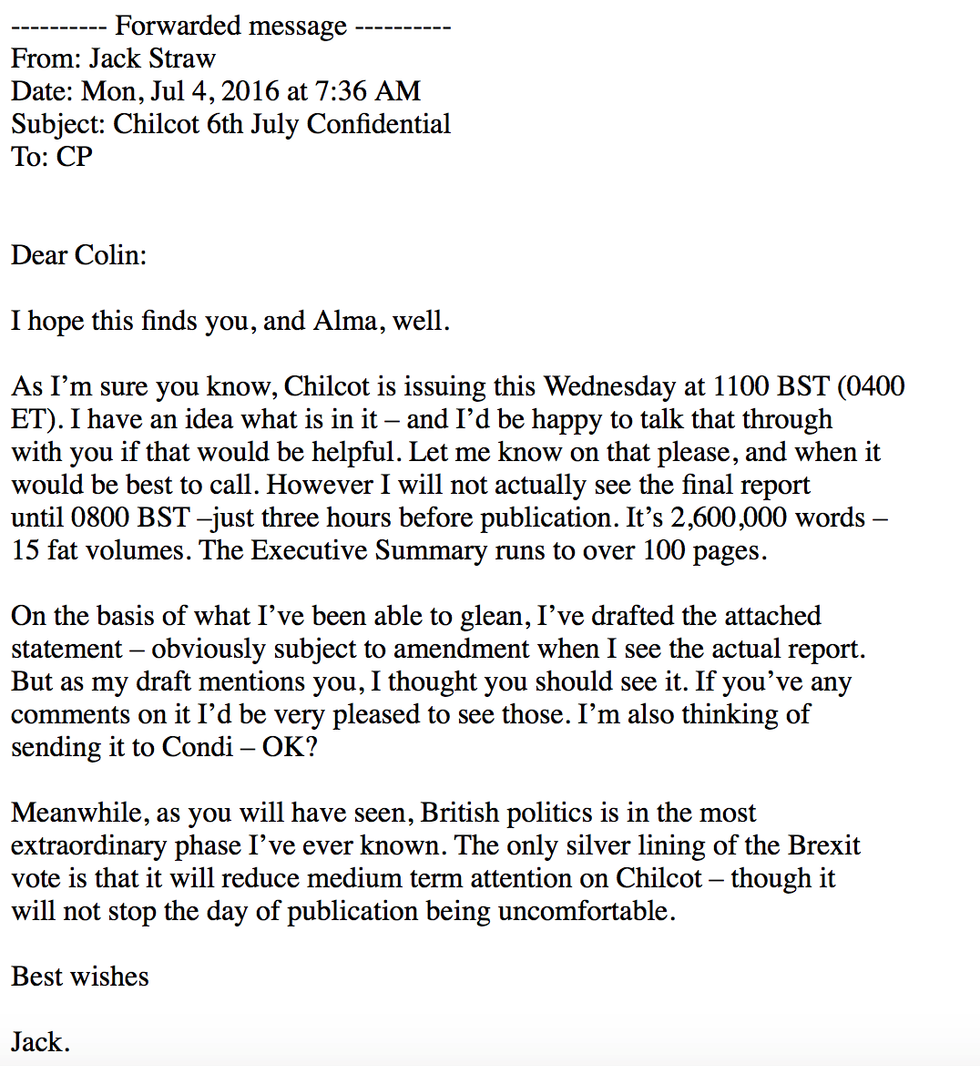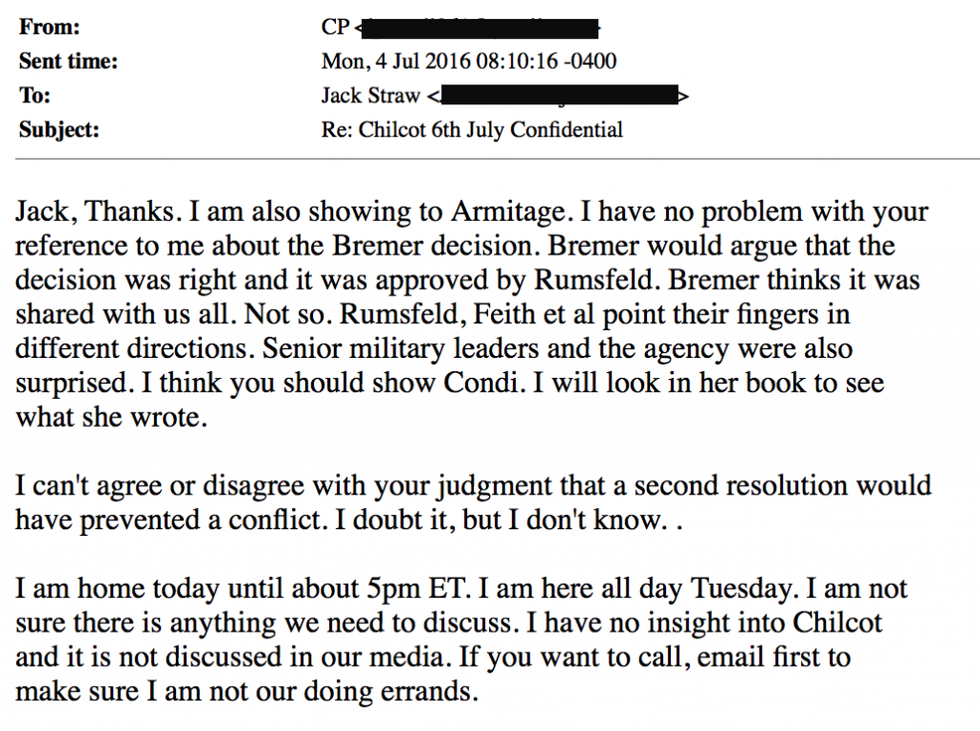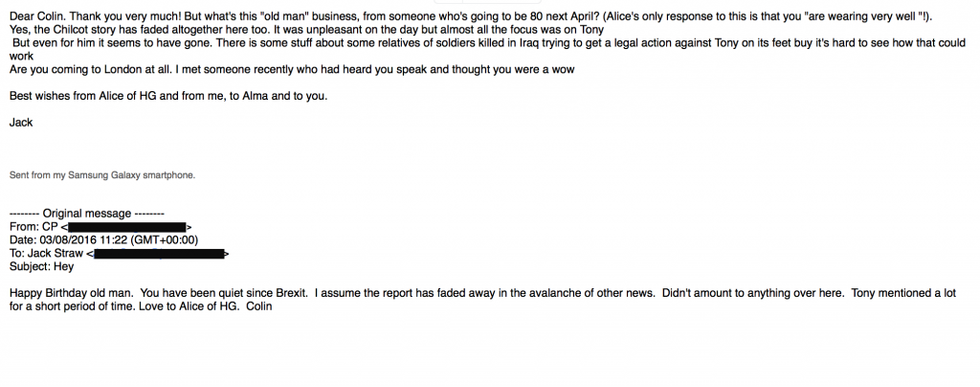

SUBSCRIBE TO OUR FREE NEWSLETTER
Daily news & progressive opinion—funded by the people, not the corporations—delivered straight to your inbox.
5
#000000
#FFFFFF
To donate by check, phone, or other method, see our More Ways to Give page.


Daily news & progressive opinion—funded by the people, not the corporations—delivered straight to your inbox.
Former British foreign secretary Jack Straw, a key player in the invasion of Iraq, expressed relief in July that the political brouhaha over Brexit would distract from the damning contents of the Chilcot Inquiry into the United Kingdom's role in the war.
"The only silver lining of the Brexit vote is that it will reduce medium term attention on Chilcot--though it will not stop the day of publication being uncomfortable," Straw wrote in an email to former U.S. Secretary of State Colin Powell, obtained by the hacking group DC Leaks and provided toThe Intercept and other news organizations on Tuesday.
The email, dated July 4, came two days before the release of the 2.6 million-word Chilcot Inquiry, which showed that the invasion of Iraq was decided well before all peaceful resolutions were exhausted, proving--as critics have long-contended--that the disastrous intervention was a war of choice.
The Brexit vote, in which the majority voted to leave the European Union, took place June 23.
As The Intercept reports, "In anticipation of coming [Chilcot] press coverage, Straw asked Powell to review a statement in a Word document he drafted."

Powell responded, advising Straw to share the statement with Powell's successor as secretary of state, Condoleezza Rice, and saying he would also show former Deputy Secretary of State Richard Armitage.
And, The Intercept adds:
He showed skepticism towards a part of Straw's statement which claimed that an additional United Nations resolution prior to the conflict would have avoided the invasion. He wrote back to Straw, "I can't agree or disagree with your judgement that a second resolution would have prevented conflict. I doubt it, but I don't know." (In Straw's final statement released to the press, the claim remained.)

The two men didn't correspond again for almost a month, at which point Powell emailed Straw with birthday wishes.
He noted Straw had been "quiet since Brexit" and appeared to confirm Straw's prediction, writing: "I assume the report has faded away in the avalanche of other news."
"Didn't amount to anything over here [in the United States]," Powell added.

Other emails contained in the Powell leak show the former secretary of state calling Republican presidential nominee Donald Trump a "national disgrace;" criticizing Democratic nominee Hillary Clinton and her campaign for using him to justify her use of a private email server at the State Department; and discussing former Secretary of Defense Donald Rumsfeld and his handling of the Iraq War.
A Memo to: Dr. Ben Carson, Hillary Clinton, Ted Cruz, John Kasich, Marco Rubio, Bernie Sanders, Dr. Jill Stein, and Donald Trump
The media brouhaha over naming your campaign advisers on foreign policy prompts this reminder of a unique resource available, gratis, to all of you. That resource is our nonpartisan group - Veteran Intelligence Professionals for Sanity (VIPS). If we were into self-promotion, we would add to our (virtual) letterhead: "Serving satisfied customers since 2003."
We are about apolitical analysis; we are into spreading unvarnished truth around; we do not shape our analysis toward this or that debating point.
We are about apolitical analysis; we are into spreading unvarnished truth around; we do not shape our analysis toward this or that debating point. Thus, we eschew the moniker "campaign adviser." But that doesn't mean we wouldn't provide apolitical and unvarnished advice to anyone who seeks it.
Unique? We are on the outer edge of atypical in the sense that we are a fiercely nonpartisan, tell-it-like-it-is group of professionals with long experience in intelligence and related fields and with no policy or personal axes to grind. We are Republicans, Democrats and Independents. Abundant proof that party preference plays no role in our analysis can be seen in our enviable record - in the substantive work we have produced over the past 13 years - both before and after the ill-advised attack on Iraq in March 2003.
Also distinguishing us from "campaign advisers," none of us in VIPS lust for a high position in a new administration; none are heavily invested in arms industries; none of us ask for a retainer. In other words, there are no strings attached to the substantive analysis we provide to all our readers and listeners. If objective, disinterested analysis is your cup of tea, we suggest that you check out VIPS's record, to include the multiple warnings we gave President George W. Bush in the months before the attack on Iraq.
In fact, VIPS was founded by a handful of former CIA analysts, including me, for the express purpose of warning President Bush that his small coterie of advisers, led by Vice President Dick Cheney, was adducing fraudulent - not mistaken - "intelligence" in promoting the concept the war on Iraq.
Indeed, in recent years VIPS has been accused of naivete in failing to understand that Bush, to whom we addressed most of our pre-war memos, was fully aware of how Cheney and his cunning co-conspirators and conmen were fabricating the false pretenses for war. We plead guilty to believing that U.S. presidents deserve unspun analysis and to trusting that honest assessments will help presidents act responsibly on behalf of the nation.
Call us old-fashioned, but we just found it hard to believe that any U.S. president would justify war on "evidence" made out of whole cloth. Equally difficult to believe was that our former colleagues would acquiesce in the deception.
So, despite the doubts that Bush really wanted the real story, we rose to the occasion, nonetheless, and issued three corporate VIPS memoranda before the attack on Iraq: (1) "Today's Speech By Secretary Powell At the UN," February 5, 2003; (2) "Cooking Intelligence for War in Iraq," March 12, 2003; and (3) "Forgery, Hyperbole, Half-Truth: A Problem," March 18, 2003.
Our commentary on Secretary of State Colin Powell's UN speech went out on the AFP wire and was widely read - abroad. Foreign media followed up with us; U.S. media - not so much. (This is the primary reason you may be learning all this for the first time).
During that critical pre-war period we took pains to use whatever entree we had to influential people. For example, I personally sought to reach then-Sen. Hillary Clinton via a key person on her staff, who assured me that the senator was being given our op-eds and our analyses to read.
In our memorandum of Feb. 5, 2003, we told President Bush we could give Powell "only a C-minus in providing context and perspective." As for input from Defense Secretary Donald Rumsfeld's Pentagon, we told the President: "Your Pentagon advisers draw a connection between war and terrorism, but for the wrong reasons. The connection takes on much more reality in a post-U.S. invasion scenario. [Emphasis in the original]
"Indeed, it is our view that an invasion of Iraq would ensure overflowing recruitment centers for terrorists into the indefinite future. Far from eliminating the threat it would enhance it exponentially."
Though it went unheeded 13 years ago, the final paragraph of VIPS's first Memorandum for the President seems quite relevant to the current discussion regarding "campaign advisers" on foreign policy. In our same-day memo to the President on Powell's UN speech we noted that he had described what he said as "irrefutable and undeniable." Our final paragraph started with an allusion to those words:
"No one has a corner on the truth; nor do we harbor illusions that our analysis is irrefutable or undeniable. But after watching Secretary Powell today, we are convinced that you would be well served if you widened the discussion beyond ... those advisers clearly bent on a war for which we see no compelling reason and from which we believe the unintended consequences are likely to be catastrophic."
Our work reflects the ethos that earlier guided the work of intelligence community analysts at CIA and elsewhere, a commitment to both objectivity and scholarship.
Our VIPS memorandum of Feb. 5, 2003, was sent to the President more than two years before the London Times published the minutes of a July 23, 2002 briefing at 10 Downing Street, during which Richard Dearlove, the head of British intelligence, reported to British Prime Minister Tony Blair on Dearlove's talks three days earlier with his U.S. counterpart, CIA Director George Tenet, at CIA headquarters. According to those undisputed minutes, Dearlove said the following:
"Military action was now seen as inevitable. Bush wanted to remove Saddam through military action, justified by the conjunction of terrorism and WMD. But the intelligence and facts were being fixed around the policy." [Emphasis added]
Our warnings to President Bush also came more than five years before the completion of a five-year investigation by the Senate Intelligence Committee on pre-war intelligence, the results of which were approved by a bipartisan majority. On June 5, 2008, the date of its release, committee chair Jay Rockefeller commented on its findings:
"In making the case for war, the administration repeatedly presented intelligence as fact when in reality it was unsubstantiated, contradicted, or even non-existent. As a result, the American people were led to believe that the threat from Iraq was much greater than actually existed."
Just So You Know
One presidential candidate is said to have "an army of several hundred, perhaps even more than a thousand, foreign policy advisers;" another has been criticized for having no "talent pool" of "trusted experts." Little is known about those advising other candidates or, for example, in which campaign headquarters erstwhile advisers to dropout candidates like Jeb Bush are now hanging their hats.
The purpose of this open letter is merely to ensure that you know that you are welcome to dip into a different and unique "talent pool" - Veteran Intelligence Professionals for Sanity (VIPS). This pool is now several hundred years deep in collective experience and brimming with the kind of knowledge that flows from senior-level work in intelligence and related fields. Our record of memoranda, averaging three per year, speaks for itself.
If nonpartisan, fact-based analysis is your cup of tea, have a look at those memoranda, which we believe are second to none in terms of candor and tell-it-like-it-is analysis. Our work reflects the ethos that earlier guided the work of intelligence community analysts at CIA and elsewhere, a commitment to both objectivity and scholarship.
That was before Director Tenet decided to welcome frequent visits by Vice President Dick Cheney to make sure CIA analysts were finding or fabricating enough "intelligence" to "justify" the launch of an unnecessary war. We take no pleasure in having been correct at the outset, in predicting "the unintended consequences are likely to be catastrophic."
One year before the United States-led coalition invaded Iraq, then-UK Prime Minister Tony Blair told the administration of President George W. Bush that he would support military action in that country, according to a memo publicized Sunday by the Daily Mail.
The revelation "flies in the face of the Prime Minister's public claims at the time that he was seeking a diplomatic solution to the crisis," the Mail points out. "He told voters: 'We're not proposing military action'--in direct contrast to what the secret email now reveals."
The document, written in March 2002 by former Secretary of State Colin Powell to Bush, was among a batch of secret emails held on the private server of Democratic presidential candidate Hillary Clinton.
"On Iraq, Blair will be with us should military operations be necessary," Powell wrote in a memo penned one week before Blair met Bush at the former president's ranch in Crawford, Texas.
"Aside from his foreign and defense secretaries, Blair's Cabinet shows signs of division, and the Labour Party and the British public are unconvinced that military action is warranted now," Powell continued, noting that Blair was likely to suggest ideas on how to "make a credible public case on current Iraqi threats to international peace" and "demonstrate that we have thought through 'the day after'."
In public comments during his time at Crawford, Blair denied that Britain was on an unstoppable path to war, saying: "This is a matter for considering all the options. We're not proposing military action at this point."
A year later, British Members of Parliament (MPs) gave Parliamentary approval for the invasion of Iraq.
According to the Mail, "A second explosive memo from the same cache also reveals how Bush used 'spies' in the Labour Party to help him to manipulate British public opinion in favor of the war."
The revelations outraged current and former MPs, at least one of whom said he felt "duped."
Former Labour MP Andrew MacKinlay, who sat on the foreign affairs select committee in the run-up to the war, told LBC Radio that he is "ashamed" to have trusted Blair about the Iraq War. "Looking at these documents this morning and everything else that has gone before, we know that this was a complete and utter deceit to me and to others," he said.
"Obviously I feel both deeply ashamed and very stupid having trusted a British prime minister, but it was a British prime minister," MacKinlay added. "One assumed that even allowing for exaggeration or inaccuracies in intelligence, I never thought it would be one hundred percent untrue, but it was--and myself and the British people, all of us, were duped."
Another unnamed senior diplomat, who according to the Mail had "close knowledge of Blair-Bush relations," said on Monday: "This memo shows beyond doubt for the first time Blair was committed to the Iraq War before he even set foot in Crawford."
Former Tory Shadow Home Secretary David Davis told the Mail that "[t]he memos prove in explicit terms what many of us have believed all along: Tony Blair effectively agreed to act as a frontman for American foreign policy in advance of any decision by the House of Commons or the British Cabinet."
Davis went on: "He was happy to launder George Bush's policy on Iraq and sub-contract British foreign policy to another country without having the remotest ability to have any real influence over it. And in return for what?"
"For George Bush pretending Blair was a player on the world stage to impress voters in the UK when the Americans didn't even believe it themselves," he concluded.
Meanwhile, a timetable for publication of an official inquiry into the UK's invasion of Iraq by Sir John Chilcot still has not been set. The Guardian reports that "there are already calls for further delays if he has not been given access to this secret memo between Powell and Bush setting out the U.S. view of Britain's position."